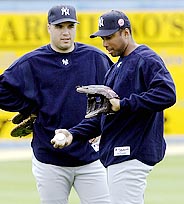|
Esta página no está disponible en español.
THE NEW YORK TIMES
ON BASEBALL: Time for Williams to Lead
By JACK CURRY
March 6, 2002
Copyright © 2002 THE NEW YORK TIMES. All Rights Reserved.
 ------------------- -------------------
Bernie Williams, right, talking with the rookie first baseman Nick Johnson.
(PHOTO: By Steve Nesius/The New York Times)
-------------------
TAMPA, Fla. Bernie Williams feels old. He crept up behind Derek Jeter this morning, patted Jeter on the stomach and jokingly wondered if Jeter had turned 25 years old yet. Jeter, who will be 28 in three months, returned a verbal volley by asking Williams when he planned to shine his shaved head.
Thirty-three. Williams whispered his age, making it sound like it was really 93 and he was resting in a retirement home. He peered around the clubhouse at the young faces, like the minor leaguer who waited to ask Jeter for an autograph, and indicated that he was trying to collect something from each day. A lesson, a discussion, a memory, anything.
Obviously, 33 is hardly ancient, even in Williams's world. He still has four years left on his seven-year, $87.5 million contract, there is an option year and, if Williams is close to some milestones at the end of his contract, he indicated that he would probably continue playing. So Williams has at least four years remaining in his career and maybe more. He may say he feels old, but he is still very good.
Although he is the center fielder for the Yankees, about as hallowed a position as there is in sports, Williams has often operated in a cozy vacuum. It is remarkable that a player of his stature has managed to drift along, his skills and politeness allowing him to routinely dodge attention in an intense environment.
Now that the Yankees have changed, losing influential veterans like Paul O'Neill, Tino Martinez, Scott Brosius and Chuck Knoblauch, Williams should change, too. A leader does not show up late for Game 6 of the World Series, as Williams did. A leader does not repeatedly bolt seconds after reporters enter the clubhouse, leaving others to explain. Williams has done that too often. The Yankees need an older Bernie to be a little wiser.
"I'm not really old, but, at the same time, I'm no spring chicken," Williams said. "It's been sort of a maturing. I guess I've reached a certain status in the clubhouse where people will listen to me when I talk."
There was wonderment in Williams's voice as he raised the notion of teammates listening to him. Sometimes, Williams acts as if he were still an oblivious 17-year-old from Puerto Rico, signing as a free agent with the Yankees. After 11 seasons with the Yankees, he has four World Series rings, a batting title, four Gold Glove Awards and five All-Star appearances, more accolades than most players can even dream about. Williams is a special player whose talents are evidenced on the field. But, off the field, he needs to be more of a presence. His voice needs to be heard.
"A lot of people, when they're leaders, don't sense that," Manager Joe Torre said. "They go out and do what they do. I think Bernie is one of those guys."
Two years ago, some of Williams's teammates were so perturbed with his reluctance to do post-game interviews that they placed a picture of him in the clubhouse lounge. The comic strip bubble beside the picture, where words normally appear, was blank. The point was obvious. Talk, Bernie, talk.
"That's not the way I am," he said, when asked about his quiet style. "So far." Then Williams referred to Don Mattingly and Paul O'Neill as two of the best leaders he had ever played with, noting that neither was especially outspoken. "That proves you don't have to be very vocal to be a good leader," he concluded.
• The Yankees do not expect Williams to suddenly organize team meetings, but even with the chatty Jason Giambi in the mix, Torre wants Williams to be more of a factor on a team with so many new players. Soon after Williams arrived here, Torre said he told Williams, "There were guys missing and we'd need him more than ever."
Torre said he thought Williams understood the intention of his message. But if Williams understood what Torre thought was important enough to tell him before the Yankees had played a game, why did Williams swat away the notion of adjusting as if it were a hanging changeup? Williams said he plays hard, plays the game with respect and is on time. Therefore, he said, "I don't think I have to change an ounce."
It was notable that Williams mentioned promptness as one of his attributes. Torre and some other Yankees were annoyed when Williams missed the team bus and was late for stretching exercises before the sixth game of the World Series. Torre covered for Williams by saying that he had business at the hotel. Williams has never explained his tardiness adequately. Even yesterday. Instead, the man who should be more of a clubhouse leader did not sound like one.
"It's more disappointing that we lost than worrying about whether I was late or not," Williams said. "Once I stepped between those lines, I gave it my best shot. That's one of the things a leader is about. No matter the circumstances or adversities, you're going to give it your best shot. And don't give any excuses."
| 
